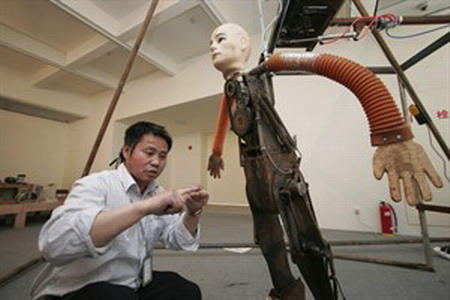-
News >China
In Shanghai, homage to China's peasant inventors
2010-06-03 09:59SHANGHAI -- The inventions on display at Shanghai's Rockbund Museum, all of them designed by peasants, are whimsically unthreatening. But the message from the curator, Cai Guoqiang, who has used gunpowder as a medium in his own work, is explosive.
The focus in the exhibit is as much on the risks and sacrifices of the 60 "Peasant Da Vincis," as Cai has dubbed them, as on their dreams and determination. One example: a motor from a homemade airplane that crashed in 2007, killing its farmer builder Tan Chengnian.
"Peasants: Making a better city, better life," says a huge slogan scrawled in red Chinese characters on a wall facing the courtyard of the museum. The exhibit opened earlier this month, just a few days after the Shanghai World Expo.
Shanghai, like virtually every other city in China, relies heavily on migrant laborers from the countryside to man construction sites, collect waste for recycling and do the myriad other dirty jobs most city natives will not touch.
The migrants work longer and harder than most city folk. The Expo opened May 1 and closes October 31, but for most migrants, the event ended when the construction stopped.
The inventors exhibit at the Rockbund honors their innovations, just as the Expo honors creativity from around the world.
"All these modern skyscrapers could not happen without the cheap labor from the countryside," said Cai, who lives in exile in New York but remains active in China, having choreographed fireworks for the opening of the 2008 Olympics that put smiley faces into the skies above Beijing.
"The dreams of the countryside people are endless. It's an important reminder that we should hold onto our dreams instead of just chasing wealth," Cai said in an interview.
"The Expo is showcasing human creativity and better standards of living. It makes sense to have an alternative expo to honor their contribution," he said.
The dozens of inventions reflect a wealth of creativity among the majority of China's 1.3 billion people who hail from rural areas, enhanced by the frugal "making do" of poverty.
Tan, the airplane inventor, built three planes. He died while marking his wife's birthday by flying the Cheng Nian No. 3, whose battered motor hangs in the foyer of the Rockbund.
"What's important isn't whether you can fly," says another of the giant slogans on the walls of the Museum's courtyard. "Never learned to land," says another.
Cai says he was first drawn by the "inutility" of the inventions. He collects items that look like artworks, that have interesting stories behind them, or whose creators could use some help, he says.

